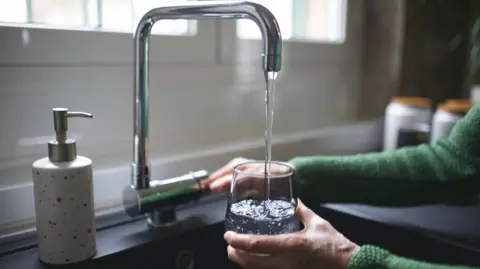Who will pay for NI's water infrastructure?
 Getty Images
Getty ImagesThis week the boss of Invest NI delivered his first annual report since he was recruited to shake-up the economic development organisation.
Kieran Donoghue reported good progress against his targets, noting that challenges include his budget and global economic uncertainty.
But he said the thing that keeps him awake at night is Northern Ireland's creaking infrastructure, particularly when it comes to wastewater.
What is worrying Mr Donoghue is that overloaded wastewater treatment works across Northern Ireland are constraining economic development.
Factories and houses cannot be built because NI Water cannot connect them to the water grid.
In 2024, BBC Northern Ireland's Spotlight programme also exposed the environmental toll, with raw sewage regularly being discharged into Belfast Lough.
The root of the problem is money.
NI Water, the publicly owned water company, has been under-funded since it was set up in 2007.
The company is required to produce six-year investment plans, known as price control periods, which have to be approved by the independent Utility Regulator.
The regulator sets the prices that NI Water can charge its business customers and defines how much money it needs from Stormont's Department for Infrastructure.
The department has never been able to fully fund those independently approved investment plans, meaning a backlog of infrastructure work has built up and continues to grow.
For example, the flagship project of the current Price Control period was the Living With Water Plan, an upgrade of the sewage works around Belfast Lough.
Earlier this year, that was deferred as rising construction meant its estimated price tag had risen to an unaffordable £2.1bn.
The hope is that it can be at least partially funded in the next Price Control period.
A consensus is emerging that this obviously failing process cannot continue.
Earlier this month an assessment by the Fiscal Council, an independent budget watchdog, concluded that the current funding model is not fit for purpose.
It added that resolving the issues will require getting new money from somewhere "even though this appears politically unpalatable".
This week the NI Chamber of Commerce and others suggested that at least some of the money should come through the rates system.
Rates are a property tax levied on households and businesses and are the main tool which the NI Executive can use to raise money.
The NI Chamber report suggested a levy, of £100 on top of the current average annual rates bill of £1200.
It would be a proportionate levy meaning those with bigger existing bills would pay more than £100, and those with smaller bills would pay less.
The Chamber chief executive Suzanne Wylie appeared on The View, BBC NI's main political discussion show, to sell the plan.
She got familiar responses from the political guests: households are already under pressure, so they can't be the source of the additional money.
The Green Party suggested additional taxes on business.
The DUP said more efficiencies should be squeezed from NI Water, while the SDLP called for another review.
Meanwhile the Sinn Féin Infrastructure Minister, Liz Kimmins, is pressing ahead with a plan to raise money from housing developers.
 PA Media
PA MediaFriday saw the conclusion of her consultation on options for a developer levy.
The two options are a compulsory levy requiring all house builders in Northern Ireland to pay into a wastewater infrastructure fund.
It is not clear how much the levy would be, nor how much it would be expected to raise.
Alternatively, there could be voluntary contributions where developers cover the cost of upgrading or replacing a particular piece of infrastructure.
The consultation document acknowledges that both options would increase costs to developers which could mean higher costs for house buyers or deter some projects.
So if Kimmins' plan makes it through the Executive it will mean that a small number of households, those buying newly built houses, will indirectly be paying for wastewater improvements.
However, the Fiscal Council has already warned that won't go far enough.
Sir Robert Chote, who chairs the council, told assembly members "it doesn't seem very likely" that it will raise the sort of money needed to transform the system.
"It could help at the margin, but it is not as much of a gamechanger as something bigger on regional rates or domestic charging."
